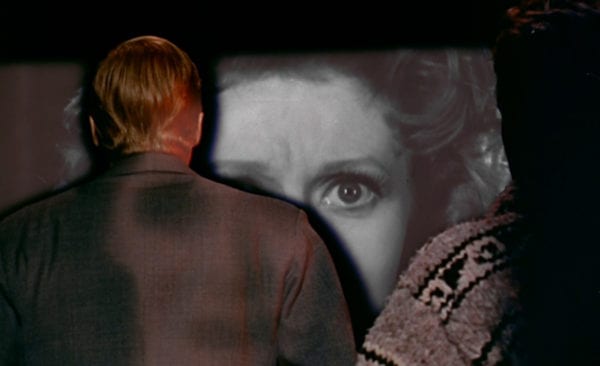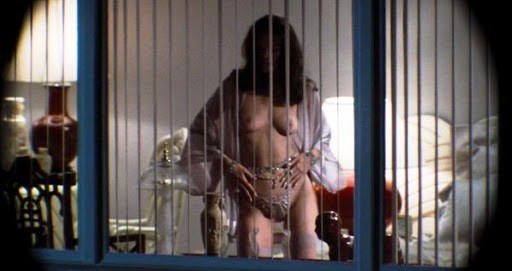Tom Jolliffe on the fascination of watching the watcher in cinema…

The voyeur in cinema. It’s been a common recurring character. What is the fascination? Why does it become so involving as a viewer, with our own voyeurs gaze on a characters life, when the protagonist becomes pre-occupied with watching someone else? Watching the watcher, as if we ourselves are seeing this odd intimacy, feels in some way more tense than just watching a character going about their daily business. The act of the character watching can be somewhat illicit, or in the case of espionage or work related films, it feels like something that is mundane and routine but, inevitably, some kind of pre-occupation begins to consume the person.
There have been many great voyeur films. The nature required within those characters to keep watching, that obsessive nature, creates an interesting character point right from the beginning. Obsessive characters, because they have this compulsion, become inherently interesting. Jimmy Stewart sits with broken leg in his wheelchair. Confined to his apartment, and his only distraction when he’s left alone becomes the day to day happenings in his apartment complex. Of course in a film by Alfred Hitchcock, there’s always going to be a twist in the tale and Stewart believes he’s witnessed a murder, and sets about persuading a couple of cohorts to do the leg work in his investigation. There’s additionally, this fascinating helplessness our voyeur has, unable to move and assist, or escape when he knows his target has rumbled his gaze.

One particularly engrossing film is Peeping Tom which focuses on a seemingly mild mannered but psychologically disturbed film-maker who becomes obsessed with stalking victims and capturing their last moments before death. To capture that look, just at the point their life escapes them. The fact our protagonist is in essence the film’s villain, and we’re following him through his odyssey of murder also feels particularly illicit. Again, the real beauty of Michael Powell’s film is the fact we’re watching this disturbed voyeur, in a film loaded with atmosphere (beautifully shot by cinematographer Otto Heller, one of the all time greats) and he makes the viewer almost complicit. We become an accessory to the spree. It’s similar with Robin Williams in One Hour Photo, a photo developer who becomes obsessed with a family, slowly beginning to infiltrate their lives.
One of Brian De Palma’s interesting 80’s works, which didn’t entirely pay off was his Hitchcockian voyeur film Body Double. A few years previously, he’d made Blow Out which saw Travolta’s sound specialist accidentally record an assassination. In Body Double he treated us to a more voyeuristic story, with the same kind of intrigues, mixing in movie theatrics and a manipulation of the protagonist (Craig Wasson). Plenty of twists, some of which stretched the imagination, but our lead, with a predilection for voyeurism is staying at a friends apartment and becomes infatuated with a woman living across the road. His obsession grows and he begins to follow her, and soon finds she may be in trouble. He then witnesses her murder and things become complicated from then on. It’s overblown but enjoyable.
When there’s an obsessive character, becoming morally corrupt over their voyeurism, it can be difficult to retain a level of sympathy, particularly if the film needs a dramatic development for them requiring sympathy. As an audience member watching the watcher, we have to be able to come back to feeling a sympathy for their dramatic outcome, to forgive the immoral journey they’ve taken us on. That kind of dramatic complexity when pulled off is great and Andrea Arnold did that particularly well in Red Road. The film, which too few people have seen is a great and engrossingly dark drama about a CCTV operator whose mind wanders during her job. It’s a role which requires a level of obsessive voyeurism as it is. She finds some of the subjects she watches fascinating, from the dancing cleaner who brings a smile to her face, to her concerns over an old and ailing dog and its owner. Complications arise when she spots someone she recognises. Slowly she becomes pre-occupied with tracking him, first on camera and then around his home and hangouts, when she sets out to seduce him. Eventually we discover what her plan is, and the reasoning in a psychologically complex drama. It’s shot with raw grit but a dark and ethereal beauty too. It captures grimy parts of Scotland in a dank but eye catching way similar to Glazer’s, Under The Skin. The central performance by Kate Dickie is also exceptional. Well worth seeing if you enjoy films about voyeurs.
I think part of that fascination is in how our protagonist will always lose a wider focus, and suffer tunnel vision. Such is the obsession that goes into their voyeurism, that level of complete immersion into who they’re watching that as the viewer we can’t help but be enthralled by that process.
What is your favourite voyeur film? Let us know your thoughts on Facebook or Twitter @FlickeringMyth…
Tom Jolliffe is an award winning screenwriter and passionate cinephile. He has a number of films out on DVD/VOD around the world and several releases due out in 2021, including, Renegades (Lee Majors, Danny Trejo, Michael Pare, Tiny Lister, Ian Ogilvy and Billy Murray), Crackdown, When Darkness Falls and War of The Worlds: The Attack (Vincent Regan). Find more info at the best personal site you’ll ever see here.













